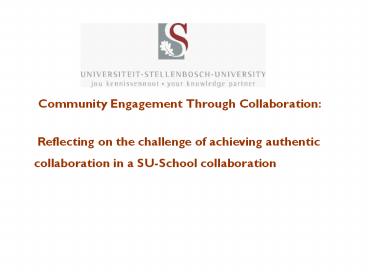Community Engagement Through Collaboration: - PowerPoint PPT Presentation
1 / 16
Title:
Community Engagement Through Collaboration:
Description:
Community Engagement Through Collaboration: Reflecting on the challenge of achieving authentic collaboration in a SU-School collaboration Building Sustainable ... – PowerPoint PPT presentation
Number of Views:65
Avg rating:3.0/5.0
Title: Community Engagement Through Collaboration:
1
Community Engagement Through Collaboration
Reflecting on the challenge of achieving
authentic collaboration in a SU-School
collaboration
- Building Sustainable Knowledge Partnerships with
the Community
2
- What theoretical lenses are there to examine
university-school collaborations? - What is the University-School Collaboration
Context? - What are some of the key challenges of the
University-School Collaboration?-A school
leadership perspective - What have we learnt about achieving authentic
collaboration?
3
- What theoretical lenses are there to examine
- university-school collaborations?
- Two categories of research on university school
collaborations - Clarification What counts as collaboration?
- Categorisation What are the different models of
collaboration?
4
THEORETICAL LENS on COLLABORATION CLARIFICATION
ISSUES
- Relationships described as
- co-operative-
- working towards a common purpose
- Separate agendas
University and schools work in parallel with
their own habitus
- Symbiotic relationships
- Mutual self-interest
- Organic relationships
- The common good above all else
Differences between university and school
- Four dimensions of difference
- Work tempo
- Professional focus
- Career reward structure
- Sense of power
- Different kinds of tensions
- Relational Tensions
- Structural Tensions
- Developmental Tensions
Bridging the thinking gap
Productive Tensions through Dialogue
BrookhartS.M.,Loadman,W.E(1992) School
university collaboration across
cultures Teaching Education, 4,(2)53-64
Marilyn Johnstone(1997)Contradictions in
Collaborations-New Thinking on School/University
Partnerships
University and schools learn to integrate
operations and transform their ways of working
into community-orientated collaborations
Holistic partnerships
5
Slaters School-University Collaboration Matrix
Slater Judith J Ravid Ruth (2010) Collaboration
in Education
Elements of Collaboration
Collaboration Type
1.Organisational involvement
5. Mutuality Level
1. PDS 2. Consultation 3. One-to-One 4. Multiple
Configurations 5. Postsecondary 6. Technology
Projects 7. Interagency
2.Formal/Informal
6. Resistance sources
3. Purpose
7.Positives
4. Resources
8. Limitations
6
- What is the SU School Collaboration context?
- SU School Collaboration Categorisation
- Mapping the flow of the interactions between
participants - Reflective Enquiry
7
CI TYPOLOGY TEACHING and CI INTEGRATION
PROJECT 1SU Mission Redress Civic
Responsiveness
PROJECT 2 Civic Responsiveness
Faculty B
After school
8
REFLECTIVE ENQUIRY
- On role
- On clarity about what there is to gain
- On the sources of the key challenges
Faculty A
Faculty C
Lecturers in support unit
Product
challenges
9
REFLECTIVE ENQUIRY
- On role
- On clarity about what there is to gain
- On the sources of the key challenges
Lecturers world
- Assumptions
- Perceptions
- Kuleana
10
3.What are some of the key challenges in the
SU-School Collaboration? A school leadership
perspective
11
REFLECTIVE ENQUIRY
- On role
- On clarity about what there is to gain
- On the sources of the key challenges
Faculty A
Faculty C
Lecturers in support unit
Product
How do I take ownership of the challenges?
12
What is the benefit for the SU student and school
learner?
13
Project 1 Why is learner commitment a challenge?
Social Factors
Knowledge Factors
Learner Incentive Factors
Change in organisational practices
Joint goal setting and planning of the
collaboration
Rethinking school assessment practices and the
participation of teachers
14
Project 2 Why was emerging teacher resistance a
challenge?
Teacher Agency-Silence
Theory
Practice
Socially embedded
Community of Practice Factor
Structural Factors
Career Growth Factor
Change in organisational practices
Revisit staff career path planning process
Joint goal setting and planning in the
collaboration
Reviewing how collaboration impacts on workload
15
4. What are the key findings about achieving
authentic collaboration?
16
THE TRANSITION TO AUTHENTIC COLLABORATION
Zone 1Separate Operating Structures of Parent
Organisation
Structures and Cultures
Resistance to change
Zone 2Co-operation and Critical Self- Reflection
Individual
Intra-group
What is replicable?
Zone 3Collaboration Integrated Learning
Organisation
Group now thinks collaboratively
Change in structures and cultures
Slater J. The process of change in
School-University Collaboration in Ravid Ruth
HandlerMarianne(2001) The Many Faces of
School-University Collaboration. Characteristics
of Successful Partnerships































